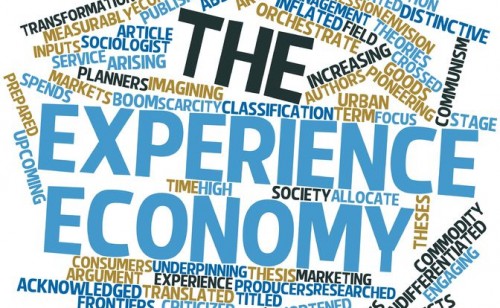
We have been talking about the experience economy for years, but what does it mean to create an experience?
And, have you ever wondered who is responsible for the total experience in your company?
Most companies I work with have subdivided the responsibility for the experience into various sections – the kitchen is responsible for the food experience, the restaurant for the table service, the reception desk for the welcome.
When doing it that way, we hope that if each of them do it well, then the total experience is going to be the best possible experience.
But if we were to apply that principle to manufacturing, we would be calling it sub-optimization. Ensuring that the parts are fantastic doesn’t guarantee that the total becomes fantastic. Purchasing the 11 best soccer players in the world does not guarantee a championship.
If you take your family to a theme park for the day – does it end up being a fantastic day because of one or two rides, or is it the integration of all the different experiences that blend into what you all feel was an exceptional day?
So, how do we ensure that the overall experience is fantastic?
I became curious about all this because I came across an article that stated that 69%of major UK companies have a customer experience manager.
The financial sector and the telecom sectors seem to lead the way. In retail, we don’t see many; and I struggled to find any in the hospitality sector at all.
Interesting.
Why have people in finance and telecoms seen the need before everyone else to appoint someone senior to take responsibility for the total experience of our customers?
I think this has to do with the fact that in the financial sector and the telecoms sector, they have a huge challenge in differentiating their product.
Once you have obtained your overdraft facility or your loan or whatever it is you want from a financial company, the difference in the actual product is not clear. A loan is a loan. The same applies to the telecom sector. If I send you an SMS, it’s difficult to know if it has been sent through Telia or Orange or whoever it is. The quality of the SMS doesn’t vary from one telecom provider to the other – although the content may vary… but that is another story.
What does vary from company to company is the actual experience you have when applying for your loan or creating your mobile phone account. Paying your bill etc.
This is something that Virgin understood years ago.
They took boring industries and tried to see if they could improve the experience. Not a cheaper experience but a more interesting or fun experience. They did it to the airline industry, they did it to trains, they’ve done it in the banking sector, telecoms, and fitness centers.
So why is the retail sector or the hospitality sector not concerned about the total customer experience – they stand out as the two sectors who don’t seem to employ customer experience managers?
They don’t see the need because when you have a shop or a hotel and you stand inside your own business and look out into the world, you are convinced that what you have is very different from any of the other products out there. Furthermore, you are convinced that, of course, the customers can tell the difference between your beautiful shop and all the other mediocre shops that are out there. It is obvious. But if you switch perspective and look at the marketplace through the eyes of the customers, what they see is a sea of sameness.
From the customer’s point of view, in each category they are all similar products that do the same things at the same prices, etc.
Which is why we have now come to a point where customer service is probably the last frontier of a sustainable competitive advantage. Products are very similar; process – the way we do things – is the differentiator.
So, if you want to out-perform your competition, you need to focus on your processes. How do all the things we do blend into that great total and unforgettable experience?
In the following blog posts, we will take a closer look at what that means.